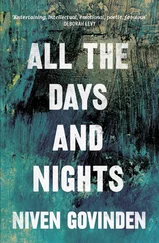Луис Бегли - All Saint's Day
Здесь есть возможность читать онлайн «Луис Бегли - All Saint's Day» весь текст электронной книги совершенно бесплатно (целиком полную версию без сокращений). В некоторых случаях можно слушать аудио, скачать через торрент в формате fb2 и присутствует краткое содержание. Жанр: Проза, short_story, на английском языке. Описание произведения, (предисловие) а так же отзывы посетителей доступны на портале библиотеки ЛибКат.
- Название:All Saint's Day
- Автор:
- Жанр:
- Год:неизвестен
- ISBN:нет данных
- Рейтинг книги:4 / 5. Голосов: 1
-
Избранное:Добавить в избранное
- Отзывы:
-
Ваша оценка:
- 80
- 1
- 2
- 3
- 4
- 5
All Saint's Day: краткое содержание, описание и аннотация
Предлагаем к чтению аннотацию, описание, краткое содержание или предисловие (зависит от того, что написал сам автор книги «All Saint's Day»). Если вы не нашли необходимую информацию о книге — напишите в комментариях, мы постараемся отыскать её.
All Saint's Day — читать онлайн бесплатно полную книгу (весь текст) целиком
Ниже представлен текст книги, разбитый по страницам. Система сохранения места последней прочитанной страницы, позволяет с удобством читать онлайн бесплатно книгу «All Saint's Day», без необходимости каждый раз заново искать на чём Вы остановились. Поставьте закладку, и сможете в любой момент перейти на страницу, на которой закончили чтение.
Интервал:
Закладка:
Louis Begley
All Saints' Day
Jake was a man of habits so fixed and precise that if you wanted a casual chat with him it was quite unnecessary to make an appointment. Provided you knew his routine. Then it was easy enough to station yourself at the right time at the place where he normally appeared at that hour. He would be there — perfectly punctual, unhurried, and serene. According to people who had known him much longer than I, it had always been so.
Of course, even in adult life, Jake’s occupations underwent occasional basic changes, with consequent modifications in his daily activities and their geographical locus. Thus, after Jake withdrew from the investment bank founded by his maternal great uncles, where he became a partner shortly after graduating from college, he no longer needed to go down to Wall Street. The center of his daytime activities shifted to a small personal office in the Lever Bros. building, consisting of his own large room, a reception area where his secretary, who had followed him from the bank, had her desk, and another room, a cross between a library and a dining room, where he held occasional meetings. Being in midtown now made it inconvenient for Jake to use the Downtown Association or the services of the old Italian barber on Broad Street. He therefore took to lunching at a French restaurant in the low Fifties, except on Mondays, when it was closed, and, after a wretched period of trial and error, settled on the barbershop in the Waldorf Astoria. He deplored its transformation some years later into a hairdresser’s salon. The manager was more than willing to continue to look after Jake, but Jake discovered that there was no one left in the establishment who cut hair like a barber. Once again, Jake was at loose ends. The solution came when a female friend recommended a barbershop on Lexington Avenue in the Seventies, to which she took her small sons. Jake was happy to discover that he liked there the daylight coming through windows from the Avenue, and the freedom from a fancy hotel’s pretensions. The haircuts were correct too, reminding him of the work of a barber in Rome he particularly appreciated, who had been located in the via Mario da Fiori and had moved to via della Vite. Except in heavy rain, when he was driven by a car service that he also used to go out in the evening, Jake went on foot to the office and back home. He walked invariably on the east side of Park Avenue from the apartment building where he lived, which was on the Avenue in the low Eighties, until he reached 57th Street. There he crossed to the other side and continued to his office. In the afternoon, the itinerary was reversed.
These walks and the rest of Jake’s city routine were naturally suspended during the summer, which for Jake stretched from early June to mid-September. During that period, he traveled in Europe, a statement that may imply more activity than actually occurred. Jake confessed to spending a few days in London, and a few days in Paris. But, by the beginning of July, he would have reached the castello in the Dolomites belonging to his sister, married to a Milanese notable. There he would stay until it was time to return to New York, with perhaps two or three days in Milan thrown in for good measure. His fellow guests at the castello have told me that there as well Jake’s life followed distinct and well-established rules. In the morning, he went for long walks, preferably with his sister and, as soon as they were old enough, her two sons. A leisurely Italian lunch followed. Afterward, until dinner, which was served late, Jake worked in his room. He would emerge in time for drinks, changed, fresh, and eager for company, willing to stay up after dinner as late as anyone over grappa, walnuts, and old Parmesan cheese.
The nature of Jake’s work has remained something of a mystery to me. There was the theory that he looked after his own and his sister’s investments. Perhaps the money of other family members was involved as well. It fit with his occasional comments about the state of the market, economic trends, and mistakes of central bank authorities. I could imagine him devoting a great deal of time at the castello to telephone calls with his office, where his secretary would have arrived by the time he finished lunch, and having other important and tense conversations with New York. The separate line he arranged already in the sixties to have installed at the castello , when telephone lines were not easy to obtain in Italy, reinforced such a hypothesis. Later, the second line would have been required for his laptop. He was an early and enthusiastic user. One might have expected him to sit on the boards of two or three of New York’s more important cultural institutions, but so far as I know that was not the case. That left the family foundation, which made grants for the benefit of performing arts. He ran it pretty much as though it belonged to him. A rather different theory of Jake’s occupations seemed to me equally plausible. It would hold that his involvement with investments was limited to speaking a couple of times each month to the investment advisers who really ran the family money, and that he spent the afternoon hours remaining after lunch on a couch in his office with a good novel or a biography, or enjoying a healthful nap. He was remarkably well read. It doesn’t much matter. The only reason I found Jake’s workday occupations intriguing was their wonderful compatibility with the sure-footed and unfailingly affable manner in which he made his way through life.
When I knew him, Jake was unmarried. If there had been an earlier marriage that ended in divorce, I have heard no mention of it. Certainly, I have not heard about Jake having had children. I confess to having wondered occasionally whether Jake was gay. There was no reason that jumped to the eye to think he wasn’t. Among men of his generation — and mine as well — it had been pretty much standard operating procedure to conceal homosexual inclinations and, even more so, active homosexuality. While a number of my classmates and other acquaintances of my age came out into the open in the late seventies and in the eighties, some of them flamboyantly, I believe the majority didn’t bother; they simply stopped keeping up their guard. The fact that in society Jake usually appeared in the company of an attractive woman with whom one might suppose he was sleeping — not infrequently it was for a long time the same woman — did not, in my opinion, prove anything one way or the other.
I am a fast walker. As I did not need to get to my office in the East Forties especially early, it was not unusual for me to catch up with Jake on his morning march down Park Avenue and be in danger of overtaking him. When that happened, I simply crossed the street, avoiding the dilemma posed: should I greet him, and keep going at my pace, perhaps with a word or two about being late for an appointment, or should I fall in step? Walks to work and home, when I manage to have my place of work within a reasonable distance from where I live, are precious to me. In addition to the benefits they bestow on the body, they offer a rare opportunity to chase ideas that get pushed aside at other times of day. I supposed that Jake might share my feelings and was reluctant to intrude on his privacy. But one morning he had slowed down and turned to contemplate the magnificent apartment building on the northwest corner of Park Avenue and 66th Street — tall, somehow standoffish, with decorative classical arches on its Park Avenue face and a cornice that seems to echo the University Club and therefore the Pitti Palace — and there I was, just a few steps behind. He could not help noticing me. He returned my greeting with greater amiability than I thought I had any right to expect, and said that, should I be disposed to slow down a bit, he would be happy if I walked with him. I accepted the offer readily.
Читать дальшеИнтервал:
Закладка:
Похожие книги на «All Saint's Day»
Представляем Вашему вниманию похожие книги на «All Saint's Day» списком для выбора. Мы отобрали схожую по названию и смыслу литературу в надежде предоставить читателям больше вариантов отыскать новые, интересные, ещё непрочитанные произведения.
Обсуждение, отзывы о книге «All Saint's Day» и просто собственные мнения читателей. Оставьте ваши комментарии, напишите, что Вы думаете о произведении, его смысле или главных героях. Укажите что конкретно понравилось, а что нет, и почему Вы так считаете.










